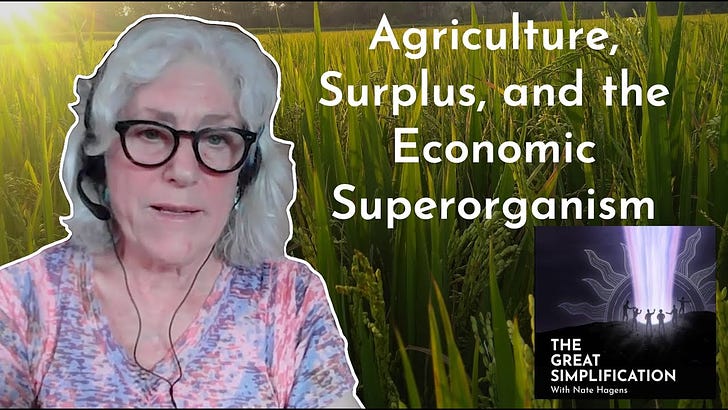Agriculture, Surplus, and the Economic Superorganism
The Great Simplification #86 with Lisi Krall
On this episode, ‘Superorganisms’ converge as economist/anthropologist Lisi Krall joins me to discuss the evolutionary origins of our current systemic predicament. Starting with the Agricultural Revolution, the evolutionary conditions of surplus and ultrasociality have combined to shape the way humans interact with their environment, ultimately leading to our current out-of-control global economy. What can our evolutionary past tell us about where we’re heading - and perhaps guide us on how to steer towards a ‘better than the default’ future?
Lisi Krall is a professor of economics at State University of New York, Cortland. Dr. Krall engages a heterodox and transdisciplinary approach to understanding economic systems, their etiology, structure, dynamic, and the relationship between humans and the more-than-human world that is contextualized through them. She incorporates evolutionary biology, anthropology, history, heterodox economics, and deep materialism to understand how we arrived at this paradoxical moment where humans appear trapped in an economic system that functions as if it is not of this Earth at the same time it is clearly a material system. Her latest book, Bitter Harvest: An Inquiry into the War Between Economy and Earth, explores the formation and evolution of the economic system (the economic superorganism) that took hold beginning with the cultivation of annual grains and is now embodied in global capitalism.
Is this global system an inevitable emergent phenomenon of the human condition? Does surplus inherently breed inequality and hierarchy, such as the current capitalist system? What type of social evolution will we experience as we meet the limits of an expansionary system and move towards a Great Simplification?
In case you missed it…
In last week’s Frankly, I reflected on 7 different continuums of perspectives people use when taking part in a “systems” discourse, such as what we’re attempting to do on The Great Simplification podcast. In such complex and often controversial discussions, each of us has a point of view that stems from our own personal experiences, knowledge, and identity - yet how we channel that point of view into the larger discourse matters.
If you appreciate The Great Simplification podcast…
Be sure to leave a review on your preferred podcast platform! Leaving reviews helps the podcast grow, which helps spread awareness of our systemic situation from experts in ecology, energy, policy, economics, technology, and community building so that we can better understand - and respond to - the challenges of the coming decade.
The Great Simplification podcast is produced by The Institute for the Study of Energy and Our Future (ISEOF), a 501(c)(3) organization. We want to keep all content completely free to view globally and without ads. If you’d like to support ISEOF and it’s content via donation, please use the link below.






Thank you so much, for sharing the wisdom of Lisi Krall. We are now living in an era of rational sense making, which is a closed form of sense making. And we are now living in an era of self-referential sense making (as persons and as species). Both of which are left hemisphere forms of sense making. We need to strengthen the counter balancing forms of sense making. Which are evolutionary sense making and social sense making. The evolutionary form of sense making is an open form of sense making, it encompasses all influence (also the influences we cannot see). It is about developing a sensitivity in seeing what patterns are emerging, how they grow and interconnect. The sense making is not what we do alone, it is the sense, the meaning that nature communicates by selecting the phenomena that come into being. The social sense making is not self-referential, but group referential, it is the meaning that the group, such as a community, gives. In evolutionary sense making the superorganism evolved. It means that there is an environment that sustains the superorganism, otherwise it would not be there. Part of that environment is the availability of cheap fosil fuels and the possibility of financial debts. The Great Simplification is not something we can construct. It has to emerge. It can only emerge if there is an environment that sustains it, otherwise it will not be selected by nature. So what we can do is work on environments that support the Great Simplification.